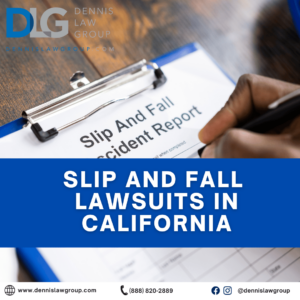Imagine this: You’re strolling through a grocery store aisle, minding your own business, when suddenly, you find yourself sprawled on the floor, a victim of an unexpected slip and fall. What do you do next? In this blog post, we will delve into the world of Slip and Fall Lawsuits in California. We will explore the legal framework surrounding these cases, understand the responsibilities of property owners, review the crucial steps for building a strong case, and discuss how to pursue fair compensation for your injuries and damages.
Understanding the Legal Framework of Slip and Fall Lawsuits in California
Slip and fall accidents are a common type of personal injury case in California. These incidents can occur anywhere, from grocery stores and restaurants to public sidewalks and private residences. If you have suffered injuries due to a slip and fall accident caused by someone else’s negligence, it’s essential to understand your rights and the legal paths available for seeking compensation.
To begin, let’s define a slip-and-fall accident. It occurs when someone slips, trips, or falls on another person’s property due to hazardous conditions. In California, slip and fall lawsuits fall under the broader category of premises liability law. Premises liability holds property owners responsible for maintaining a safe environment for visitors and guests. Some common hazards encountered in slip-and-fall accidents include wet floors, uneven surfaces, broken stairs, inadequate lighting, and debris obstructing walkways. As an injured party, it’s crucial to document the hazardous condition and gather evidence to support your case.
The Responsibility of Property Owners
Property owners have a legal duty to maintain their premises in a reasonably safe condition. This duty of care extends to all visitors, including customers, tenants, and even trespassers in some cases. However, the level of duty owed to each visitor may vary.
Here are the different types of visitors and the corresponding duty of care:
| Invitee | Highest duty of care. Property owners must regularly inspect their premises, address any potential hazards, and warn visitors of known dangers. | ||
| Licensee | Moderate duty of care. Property owners must warn licensees of any known hazards but are not required to regularly inspect the premises. | ||
|
Trespasser |
Minimal duty of care. Property owners are not obligated to warn trespassers about potential dangers, except for willful or intentional harm. However, they can’t intentionally cause harm to trespassers. |
California follows a comparative negligence law, which means that the compensation awarded to the injured party may be reduced based on their degree of responsibility for the accident. However, if the injured party is found to be more than 50% at fault, they may be barred from recovering any compensation.
It’s important to note that slip and fall accidents are subject to a statute of limitations, the time limit within which a legal action must be filed. In California, the statute of limitations for slip and fall cases is generally two years from the date of the accident. Fulfilling a lawsuit within this timeframe can result in losing your right to seek compensation.
Free consultations are available with Our Slip and Fall Lawyers in California
At Dennis Law Group, we know that finding the right slip-and-fall lawyer is important to your success.
You can find out whether you have a valid case at no cost to you. That’s because we offer free consultations. To request a free consultation with our team, call (888) 820-2889 or visit www.dennislawgroup.com.
